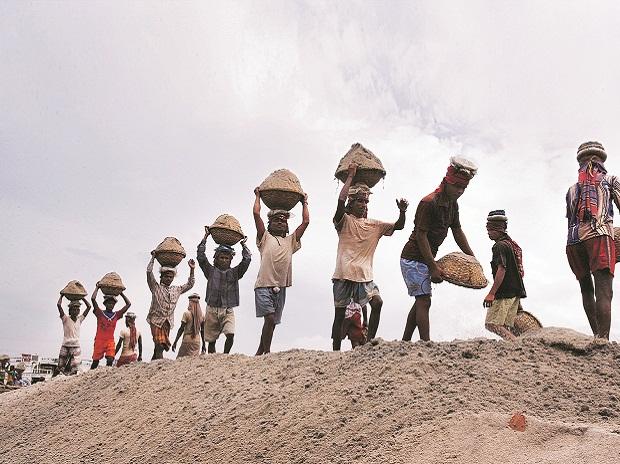Dilution of labour laws
2020 MAY 10
Mains >
Social justice > Human Resources > Vulnerable & Backward sections

WHY IN NEWS?
All central trade unions, except the one affiliated to the ruling party have filed a complaint with the International Labour Organisation (ILO) against the Centre and State governments’ dilution of labour laws and practices.
THE COMPLAINT
- The complaint says the recent amendments of laws have undermined various ILO conventions.
- State governments through amendments by executive order or ordinance have given blanket exemptions to all establishments for certain labour laws for a period of three years, which would have the following implications:
- Employers may hire and fire workers at their convenience
- Freeze collective bargaining rights
- Undo the rights of occupational safety and health
- Remove Labour Department’s intervention for any inspection of the basic bare minimum needs for decent working conditions
- The trade unions also pointed to the plight of migrant workers who are trapped without support due to the suddenly announced lockdown and several lives lost on their way back home on roads, railway tracks - due to hunger, exhaustion and accidents.
- The daily working hours have been increased from 8 to 12 hours through executive order in various states which is in violation of the Factories Act.
- Possible implication
- If the ILO acts on the complaint it could adversely impact India’s trade with many countries that have adopted ILO conventions.
THE CURRENT SCENARIO ON LABOUR LAWS
- Some States (Uttar Pradesh, Madhya Pradesh, Assam etc) have decided to call off some of the labour laws and declared that only some basic laws will prevail like the - Workmen Compensation Act, 1923, Bonded Labour System (Abolition) Act, 1976, Section 5 of the Payment of Wages Act, 1936 etc.
- This affects a huge range of worker protections including laws relating to:
- Occupational safety
- Health and working conditions of workers
- Settling industrial disputes
- Trade unions, contract labourers, and migrant workers.
- The implications is that the employers do not need to follow basic safety norms in factories, ensure minimal working conditions or to compensate workers for industrial accidents among others.
- And when conditions become completely impossible and inhumane, workers cannot organise to improve them, as trade union activity and the right to organise are also suppressed.
- The states that did not opt for such extent of dilution has brought in similar changes with a few variations.
CONSTITUTIONAL PROVISIONS RELATING TO LABOUR WELFARE
- Fundamental Rights
- Article 14 - commands State to treat any person equally before the law.
- Article (19) (1) (c) - grants citizens the right to form association or unions.
- Article 21 - promises protection of life and personal liberty.
- Article 23 - prohibits forced labour.
- Article 24 - prohibits employment of children below the age of fourteen years.
- Directive Principles of State Policy (DPSP)
- Article 39(a) - provides that the State shall secure to its citizens equal right to an adequate means of livelihood.
- Article 39A - provides that the State shall secure the equal opportunities for access to justice to its citizens and ensure that such opportunities are not denied by reason of economic or other disabilities.
CAN THE DILUTION OF LAWS BE JUSTIFIED?
- It is a fact that Covid-19 has created an extraordinary situation warranting extraordinary measures but that does not mean governments can suspend, abrogate or abuse laws so as to curtail the constitutionally guaranteed rights to the people.
- The purpose of these extraordinary harsh anti-worker measures is apparently to attract foreign investment to these states, in the mistaken belief that multinational companies that had earlier chosen China as a base will shift to India in the post-pandemic world.
- Doing away with the labour laws can in fact will hurt the economy in the longer run due to conflicts and put the workers in a state of slavery.
- It is absurd to suggest that high labour costs are holding back private investment in India. India already has one of the cheapest and most exploited labour forces in the world.
- According to the Annual Survey of Industries 2017-18, wages to workers were less than 3 percent of total input costs for India as a whole.
- Wages in India have been consistently much lower than in China and implementation of labour protection has been much worse, yet India has not attracted even a small fraction of the FDI flowing into China, despite liberalising rules and providing various other concessions.
- In addition, suppressing wage incomes and damaging workers’ protection reduces their ability to demand goods and services, which will further reduce aggregate demand.
WAY FORWARD
- Even six weeks into the lockdown, almost nothing has been done to provide them the minimum protection.
- Companies base their investment decisions by considering
- Decent infrastructure
- Efficient logistics, access to port and railways
- Uninterrupted energy supply
- A vibrant domestic market
- Transparent official procedures.
- They also prefer a healthy, educated, productive workforce.
- Thus, India should work on improving the following parameters.
- The best decision government can take in current situation is - give fiscal stimulus to suppliers and provided income support to those on the demand side.
Practice Question
Q. Many labour laws were diluted following the corona pandemic lockdown to attract investments, and to keep the industries and establishments running. Is dilution of labour laws a sustainable way of improving growth and development. Critically examine.
